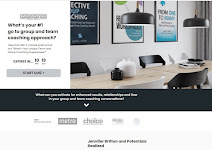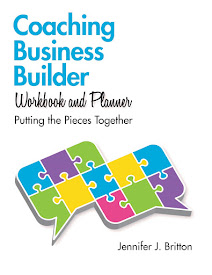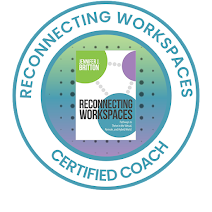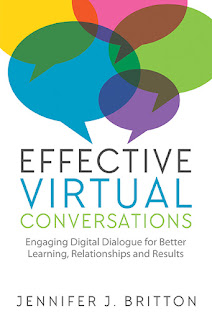Best Practices for Group Coaching
Copyright 2007 - Jennifer Britton
I am often asked about what are some of the best practices in group coaching. In this and subsequent posts I will be covering a number of the best practices I have seen from my work and other leaders in the field.
Chances are that you are looking to expand your own group coaching programs, or launch your own. Why reinvent the wheel? I hope that the ideas included in this and other posts will support you in developing an even more powerful group coaching program of your own.
Best Practice #1 - Less Is More
If you have been following my blog, or have heard me speak, you'll know that I am passionate about the concept of less is more in any group program context. Often we are so eager to provide as much value as we can that we overload a program with information. Group coaching, like individual coaching, is all about holding the space for the client, enabling them to expand their perspectives and deepen their learning. By filling the space with information, we are moving from a group coaching context to one which is a workshop, or at the extreme, a lecture. To explore this concept, take out 20% of the content you currently offer (or plan to offer in a program) and set it aside for something else (prehaps a new program, a new information product etc).
To explore this best practice, ask yourself, "What would "less is more" look like in my program?". Write it down.
Best Practice #2 - Recognize that clients will learn and respond in different ways
I haven't blogged a lot about the topic of learning styles, but this is an area I am particularly interested in. Every individual learns in different ways --- some are visual, some auditory (learn by hearing) while others learn kinesthetically (by doing, or experientially). Research is showing that a vast majority of adults are primarily a visual learner.
To explore this best practice, ask yourself, "What type of learner am I?". For a fun assessment, you may want to check out Learnativity.com where Marcia Conner offers a couple of free assessments including a learning styles assessment and a motivation styles assessment.
Also as yourself, "How can I design my program to address the different learning styles". What can you do involving the visual channel, the auditory channel and the body?
Create some space this week to explore these two best practices for group coaching and how they can shape your own program. I'll be back next week with a few others!
Have a wonderful week,
Jennifer
Jennifer Britton, CPCC, CHRP, CPT
Potentials Realized
Group Coaching Essentials
Toll Free: 1-866-217-1960
By popular demand, I will be offering the next Group Coaching Essentials program in the evenings! The March program will start on Monday March 12 from 8-9:15 pm (EST). We will meet on March 12, 19, 26 and April 2/07. The program is designed to support you in the development, implementation and marketing of your own group coaching program. We will also hold a fifth group call in May at a time convenient for the group, and you will receive a 70 page e-manual for the program. The program is limited to 8 coaches per session - calls can be recorded if you can't make one. The cost of the program is $225 US. To register contact Jennifer at jennifer@potentialsrealized.com or toll free at 1-866-217-1960. I look forward to having you join us!
Thursday, February 22, 2007
Tuesday, February 13, 2007
Two new coaching survey reports
You may have seen these already but two research reports were published last week - the ICF Global Coaching Survey, and the 2007 Executive Coaching Report from Marketing Sherpa. Both reports provide important data for the coaching profession.
Some of the key findings from the International Coach Federation (ICF) Global Coaching Survey undertaken by PriceWaterhouse Coopers included:
* The approximate annual worldwide revenue produced by coaching is $1.5 billion (USD).
* Coaches earn an average of $50,510 (USD) per year.
* 69% percent of coaches are female.
* The average coach is 46-55 years old, has coached for 5-10 years, and 53 percent of coaches have acquired an advanced level of education (i.e., Master's Degree or Ph.D).
* The majority of coaches maintain 11 active clients at any given time.
* Coaching clients tend to be 56 percent female/44 percent male, and between 38 and 45 years of age.
More information can be found at the ICF website under the ICAW materials.
The second report recently published is the 2007 Global Executive Coaching Survey from Marketing Sherpa. This report also provides critical data on the executive coaching field, and will be of interest to coaches who undertake corporate work. Their survey can be found at http://www.sherpacoaching.com/survey.html. The site also includes three useful articles on Executive Coaching including:
"Can I Get My Money Back? What’s the Return on Investment for Executive Coaching?" looking at ROI for executive coaching, along with formulae you can use to calculate it.
"Executive Coaching Gets Personal", which looks at the trends in the delivery of executive coaching, as well as survey results.
and "Do You Believe in Coaching? Who gets a Coach, and Why", looking at how HR professionals and purchasers of coaching view coaching.
There is some very interesting and important data in both reports -- I hope that you will be able to check these out. What are your thoughts on the reports -- please feel free to comment below!
With best wishes,
Jennifer
Jennifer Britton, CPCC, CHRP, CPT
Potentials Realized
GroupCoachingEssentials.com
Email: jennifer[at]potentialsrealized[dot]com
Toll Free: 1-866-217-1960
The Group Coaching Essentials program starts this Thursday at 10:30 am (EST). Are you looking to launch your own group programs soon? If so, I hope that you will consider joining us. The program is a hands-on, interactive teleseminar program, designed to support coaches to create their own group coaching programs. We cover The Essentials of Group Coaching, Designing and Implementing Your Group Coaching program, Marketing and Exercises for Your Group Coaching program. This month's program will be meeting on Thursdays from 10:30 - 11:45 am (EST) on February 15, 22, March 1 and 8th, plus an additional call in April/May. I would love to have you join us ---a few spaces still remain! For more information, please click here, or give me a call at 1-866-217-1960. Alternatively you can also email me at jennifer[at]potentialsrealized[dot]com. Looking forward to speaking with you!
Some of the key findings from the International Coach Federation (ICF) Global Coaching Survey undertaken by PriceWaterhouse Coopers included:
* The approximate annual worldwide revenue produced by coaching is $1.5 billion (USD).
* Coaches earn an average of $50,510 (USD) per year.
* 69% percent of coaches are female.
* The average coach is 46-55 years old, has coached for 5-10 years, and 53 percent of coaches have acquired an advanced level of education (i.e., Master's Degree or Ph.D).
* The majority of coaches maintain 11 active clients at any given time.
* Coaching clients tend to be 56 percent female/44 percent male, and between 38 and 45 years of age.
More information can be found at the ICF website under the ICAW materials.
The second report recently published is the 2007 Global Executive Coaching Survey from Marketing Sherpa. This report also provides critical data on the executive coaching field, and will be of interest to coaches who undertake corporate work. Their survey can be found at http://www.sherpacoaching.com/survey.html. The site also includes three useful articles on Executive Coaching including:
"Can I Get My Money Back? What’s the Return on Investment for Executive Coaching?" looking at ROI for executive coaching, along with formulae you can use to calculate it.
"Executive Coaching Gets Personal", which looks at the trends in the delivery of executive coaching, as well as survey results.
and "Do You Believe in Coaching? Who gets a Coach, and Why", looking at how HR professionals and purchasers of coaching view coaching.
There is some very interesting and important data in both reports -- I hope that you will be able to check these out. What are your thoughts on the reports -- please feel free to comment below!
With best wishes,
Jennifer
Jennifer Britton, CPCC, CHRP, CPT
Potentials Realized
GroupCoachingEssentials.com
Email: jennifer[at]potentialsrealized[dot]com
Toll Free: 1-866-217-1960
The Group Coaching Essentials program starts this Thursday at 10:30 am (EST). Are you looking to launch your own group programs soon? If so, I hope that you will consider joining us. The program is a hands-on, interactive teleseminar program, designed to support coaches to create their own group coaching programs. We cover The Essentials of Group Coaching, Designing and Implementing Your Group Coaching program, Marketing and Exercises for Your Group Coaching program. This month's program will be meeting on Thursdays from 10:30 - 11:45 am (EST) on February 15, 22, March 1 and 8th, plus an additional call in April/May. I would love to have you join us ---a few spaces still remain! For more information, please click here, or give me a call at 1-866-217-1960. Alternatively you can also email me at jennifer[at]potentialsrealized[dot]com. Looking forward to speaking with you!
Sunday, February 04, 2007
Group Program Tools - Index Cards

5 Ways to Use Index Cards for Your Group Programs
Copyright 2007 - Jennifer Britton. All Rights Reserved
Copyright 2007 - Jennifer Britton. All Rights Reserved
Photo Compliments of Alicia Solario
I often have coaches and trainers ask me what simple, inexpensive items can be used within programs. One of the cheapest items you may want to add to your toolbox is index cards. Today’s post includes 5 ways you can use index cards (and also index card sized Post-Its) in your own group coaching or training programs.
For Course Design – Index cards are a great tool to use when designing a course. Set aside 10 minutes to brainstorm on an upcoming program you are offering. Using one card per idea, write down everything that comes to mind. You may want to include topic ideas, exercises, venue, pricing etc. After you have exhausted all your ideas, lay them out on the floor or on a large table. What connections do you see there? How can these be grouped?
For a more complete description of this process, email me at jennifer [at] potentialsrealized[dot]com for a free two article entitled “Creative Ways to Develop Workshops or Retreats”.
As an icebreaker – One of my favorite icebreaker activities for corporate and personal sessions is to use a large size index card and have participants fold these over creating a name tent for the session (if we are using tables and chairs as part of the set up). Alternatively you can have them use these as a name tag. I will often ask them to write down their name and also develop their own personal crest or logo. When we go round for introductions, participants introduce themselves by name and logo. This exercise can also be done in pairs for more detailed dialogue. The logo/crest is a great theme to return to throughout the program.
For evaluation – In addition to a formal evaluation at the end of every program I run, I seek feedback from participants throughout the length of program (i.e. at the end of a weekly session). Three questions I tend to usually ask are “ What worked well?”, “What can we do differently next time?”, and “What are you taking away?”.
Index cards (as well as Post-Its) can work great for this exercise as well – distribute three blank index cards to each participant, and have these three questions written up on a piece of flipchart paper. Get participants to write down their answer to each question, and when they are all done (usually 3-5 minutes) have each participant post their cards under the respective question. This can be done individually – so having everyone come up, read their card and post it, or it can be done as a group. This will give you a very quick, and visual, overview of what’s working, what’s landing and what change may be needed. Participants also tend to find this more participatory and interactive.
To mine expectations: If you don’t have the chance to connect with participants prior to the start of the program, distribute index cards to each individual as part of the kick off of the program, and have them write down what they want to take away from the program, any hopes they have for the program and any fears. You can have participants share these as part of their introductions, in small groups, or by posting them individually on a wall.
For deciding where to go – Sometimes programs will have a very loose structure, and often methodology you are basing programs on, encourage participant driven agendas. Again index cards serve a wonderful function for this – distribute 2-3 index cards per person, and have them write down the topics they would like to have covered, or questions answered as a result of their participation. As an exercise, have them post these individually on a blank wall, grouping similar topics. This too is a wonderful visual exercise to undertake with a group, ensuring that all voices are heard and represented.
I’m really just scratching the surface with these ideas. Over the years I have found post-its and index cards to be an invaluable tool in my toolbox. Are there any other ways you have used index cards or post-its? Please feel free to comment below.
Have a creative week,
Jennifer
I often have coaches and trainers ask me what simple, inexpensive items can be used within programs. One of the cheapest items you may want to add to your toolbox is index cards. Today’s post includes 5 ways you can use index cards (and also index card sized Post-Its) in your own group coaching or training programs.
For Course Design – Index cards are a great tool to use when designing a course. Set aside 10 minutes to brainstorm on an upcoming program you are offering. Using one card per idea, write down everything that comes to mind. You may want to include topic ideas, exercises, venue, pricing etc. After you have exhausted all your ideas, lay them out on the floor or on a large table. What connections do you see there? How can these be grouped?
For a more complete description of this process, email me at jennifer [at] potentialsrealized[dot]com for a free two article entitled “Creative Ways to Develop Workshops or Retreats”.
As an icebreaker – One of my favorite icebreaker activities for corporate and personal sessions is to use a large size index card and have participants fold these over creating a name tent for the session (if we are using tables and chairs as part of the set up). Alternatively you can have them use these as a name tag. I will often ask them to write down their name and also develop their own personal crest or logo. When we go round for introductions, participants introduce themselves by name and logo. This exercise can also be done in pairs for more detailed dialogue. The logo/crest is a great theme to return to throughout the program.
For evaluation – In addition to a formal evaluation at the end of every program I run, I seek feedback from participants throughout the length of program (i.e. at the end of a weekly session). Three questions I tend to usually ask are “ What worked well?”, “What can we do differently next time?”, and “What are you taking away?”.
Index cards (as well as Post-Its) can work great for this exercise as well – distribute three blank index cards to each participant, and have these three questions written up on a piece of flipchart paper. Get participants to write down their answer to each question, and when they are all done (usually 3-5 minutes) have each participant post their cards under the respective question. This can be done individually – so having everyone come up, read their card and post it, or it can be done as a group. This will give you a very quick, and visual, overview of what’s working, what’s landing and what change may be needed. Participants also tend to find this more participatory and interactive.
To mine expectations: If you don’t have the chance to connect with participants prior to the start of the program, distribute index cards to each individual as part of the kick off of the program, and have them write down what they want to take away from the program, any hopes they have for the program and any fears. You can have participants share these as part of their introductions, in small groups, or by posting them individually on a wall.
For deciding where to go – Sometimes programs will have a very loose structure, and often methodology you are basing programs on, encourage participant driven agendas. Again index cards serve a wonderful function for this – distribute 2-3 index cards per person, and have them write down the topics they would like to have covered, or questions answered as a result of their participation. As an exercise, have them post these individually on a blank wall, grouping similar topics. This too is a wonderful visual exercise to undertake with a group, ensuring that all voices are heard and represented.
I’m really just scratching the surface with these ideas. Over the years I have found post-its and index cards to be an invaluable tool in my toolbox. Are there any other ways you have used index cards or post-its? Please feel free to comment below.
Have a creative week,
Jennifer
Jennifer Britton, CPCC, CHRP, CPCC
Group Coaching Essentials and Potentials Realized
Email: jennifer[at]potentialsrealized[dot] com
Toll Free: 1-866-217-1960
The next Group Coaching Essentials program starts on Thurs. February 15th and will be held on Thursdays from 10:30 - 11:45 am (EST) on Feb. 15, 23, March 1 and 8, plus one additional call. This program is designed for coaches who want to create their own group coaching programs. Full of templates, exercises, best practices and resources, this program supports coaches in designing, implementing and marketing their own group coaching program. Space is limited to 8 coaches. Are you ready to launch your own programs? To reserve your spot for our February session, contact me today by email or toll free at 1-866-217-1960. I look forward to hearing from you.
Group Coaching Essentials and Potentials Realized
Email: jennifer[at]potentialsrealized[dot] com
Toll Free: 1-866-217-1960
The next Group Coaching Essentials program starts on Thurs. February 15th and will be held on Thursdays from 10:30 - 11:45 am (EST) on Feb. 15, 23, March 1 and 8, plus one additional call. This program is designed for coaches who want to create their own group coaching programs. Full of templates, exercises, best practices and resources, this program supports coaches in designing, implementing and marketing their own group coaching program. Space is limited to 8 coaches. Are you ready to launch your own programs? To reserve your spot for our February session, contact me today by email or toll free at 1-866-217-1960. I look forward to hearing from you.
Subscribe to:
Posts (Atom)









